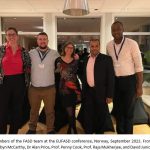
SalfordFASD Professor Becomes Pro-vice Chancellor
Professor Penny Cook, the founding lead of the SalfordFASD research group has been appointed as the Interim Pro-Vice Chancellor Research and Enterprise of the University of Salford. Penny is a professor of Public Health and Epidemiology with keen interest in fetal alcohol spectrum disorders (FASD) and has grown the SalfordFASD team to become the largest […]






